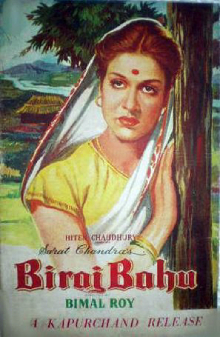| Biraj Bahu | |
|---|---|
 | |
| Directed by | Bimal Roy |
| Written by | Saratchandra Chattopadhyay (novel) Nabendu Ghosh (adaptation) Nasir Hussain (dialogue) Bimal Roy (screenplay) |
| Produced by | Hiten Choudhury |
| Starring | Kamini Kaushal Abhi Bhattacharya Pran |
| Cinematography | Dilip Gupta |
| Edited by | Hrishikesh Mukherjee |
| Music by | Salil Chowdhury |
Production company | Hiten Choudhury Productions |
Release date |
|
| Country | India |
| Language | Hindi |
Biraj Bahu is a 1954 Hindi film produced by Hiten Choudhury and directed by Bimal Roy, [1] and based on a Bengali novel by Saratchandra Chattopadhyay. The film stars Kamini Kaushal, Abhi Bhattacharya and Pran and has music by Salil Chowdhury. The film won the All India Certificate of Merit for Best Feature Film.
Contents
Madhubala, the highest-paid actress of that time, was eager to play the lead role in the film. She had visited Bimal Roy's office several times for this purpose. However, thinking that she would ask for high fee for doing the film, he cast Kamini Kaushal instead of her. Learning that her fee lost her the role, she had said that she would have acted for even one rupee in Biraj Bahu. [2]